
Discover more from Sense of Awareness
PFIZER AND THE ROYAL THAI FAMILY
There's been a lot of talk in the last few days about the possibility that the Royal Thai family will nullify the Pfizer contracts. Let's make things clear.
By Ehden Biber
Since the news of the collapse of the Thai princess came, and the revelations that the Thai royal family are furious because it seems her condition is a result of the Pfizer shot, there has been lot of chatter about the possibility that Thailand will nullify their contract with Pfizer. The purpose of this post is to help people understand the legal framework which will govern such attempt.
First, I invite everyone who has been talking about the idea that the Thai royal family will simply nullify the agreement they signed with Pfizer to read what I've written in July 2021, after discovering THE ONLY PFIZER MANUFACTURING AND SUPPLY AGREEMENT that we can discuss in certainly as authentic, which is the Brazilian one (as part of my #PfizerLeak revelations on twitter, a day after I shared the Albanian contact).
If you want to understand the Pfizer negotiation process that led to the signing of the manufacturing and supply agreement by Thailand, read my post entitled “The Negotiations”. The highlights from Carlos Murillo's testimony are truly pivotal!
The important point is: Thailand cannot risk nullifying the contract because they put as collateral against this contract ALL OF THE COUNTRY ASSETS, including currency reserves and embassies!
If Thailand will want to dispute the contract, the need to go to an arbitration process, govern by the International Chamber of Commerce (ICC) arbitration process. Each side will nominate an arbitrator, and the ICC court will nominate the chair, who will make the decision.
The problem is that since a court case against Pfizer/BioNTech regarding their product will take place in NY, it will be govern by the PREP act, conducted in an where willful misconduct requires a proof or 3 things (below). While we have evidence on #3, how exactly will anyone clearly prove #1 & #2?
Practically, the ONLY WAY anyone can nullify the contracts is if they can prove that BioNTech who developed the "vaccine" knowingly planned to kill people. Why do you think the creators of this deadly shot got involved in writing a book about it? They were trying to frame their narrative.
HOWEVER!!!
In my honest opinion, countries MIGHT have ONE get-out-of-jail-ticket from these draconian contracts, as the executive branch (government) signed a SECRET commitment that the contract cannot and will not be overruled by legislative & judiciary branches. But… it’s not going to be that easy. After all, will claims of unconstitutional contract work in this court? I cannot tell. Also, as the chair decides, it's a high risk.
To understand the complexity of the international arbitration process, I STRONGLY RECOMMEND reading "What's law got to do with it? The role of governing law in international commercial arbitration" by Jennifer L. Permesly (@SkaddenArps), from 2018.
Here are some important quotes from the article:
“An arbitrator who decides according to some other law, whether a national or otherwise, presumes to rewrite the bargain”
“an arbitrator’s primary duty is to interpret the terms of the parties’ contract in accord with their expectations.”
“In the arbitrator’s decision-making process, his "reason and logic", rather than the statutory rulebook of interpretation, are considered the guiding light for his interpretation of the disputing parties’ contract.”
“arbitrators are free to consider sources of transnational and international law in addition to the national law rules chosen to govern the contract.”
“some arbitrators have resorted to a hybrid method, mixing the concepts of trade usages, general international principles, and lex mercatoria into a sort of interpretative stew”
“Most legal systems provide that that arbitrators’ determinations on the substance of the dispute are not subject to judicial review. On this premise, some have suggested that arbitrators are free to disregard certain principles of governing law, and even to replace the law chosen by the parties in favor of a different domestic law or transnational principles, without fear of repercussion.”
“One of the most contentious features of United States arbitral law is the doctrine that permits vacatur of an arbitral award based on a "manifest disregard of the law" by the arbitrators”
“most commentators concede that arbitral awards may be reviewed where the decision would violate national or international public policy, which could encompass situations where an arbitrator’s decision not to apply "mandatory rules" of national law is considered to violate a public policy of the enforcing state.”
“the privacy of the arbitral process and the absence of full scrutiny of arbitrators’ substantive decisions may incentivize some international arbitrators to depart from legal decisional norms”
“the incorporation of international arbitration in the parties’ contract may be more meaningful than their choice of governing law.”
“At its most basic, governing law can offer predictability of result, or at least a meaningful and experience rich body of law and precedent to guide the substantive result.”
“Perhaps the very lack of judicial review of arbitrators’ substantive decision-making has contributed to a lacuna in this area; we have developed clear and nearly universally accepted standards to address various procedural issues in arbitration, but leave the scope and nature of legal decision making distinctly to the individual arbitrator.
“Nearly all arbitral institutions, as well as the UNCITRAL Model Law and UNCITRAL Arbitration Rules, provide that arbitrators "shall" or "will" apply the law or rules of law designated by the parties in their agreement.”
“The ICC Rules similarly envision the application of the law chosen by the parties, stating that the "parties shall be free to agree upon the rules of law to be applied by the arbitral tribunal to the merits"”
“While it is not clear that these directives go so far as to preclude reference to principles falling outside of national law, there is no reason that they should be considered any less indicative of party intent than, for example, the "clear and unmistakable evidence" to allow arbitrators to decide their own jurisdiction that is commonly found by U.S. courts when parties refer their dispute to arbitral rules containing provisions regarding competence-competence.”
“the prevailing view is that arbitrators should not resort to lex mercatoria where not expressly authorized to do so by the parties in their contract.”
“Modern arbitral procedure tends to focus on facts and procedure over the application of legal standards; counsel and arbitrators share responsibility for this trend.”
“There are myriad ways in which these issues can be addressed, all of which first and foremost rely on attention, rigor, and care from arbitrators and counsel alike. A few specific proposals for ways in which legal decision-making might be elevated and prioritized include:
Reference to burdens/standard of proof and evidentiary standards in order to place emphasis on those facts relevant to the legal dispute at hand.
Consideration of early dismissal of claims without legal merit.
Constitution of a tribunal familiar with the law and/or reliance on legal experts, where necessary.”
“Increased attention to the governing law chosen by the parties, including by insisting that a party’s claims and defenses be framed within the applicable legal construct and by providing clear and consistent reasoning as to when and how transnational principles will be applied, are small steps that could go a long way in re-elevating the role of "law" in arbitral decision-making.”
Again - I HIGHLY RECOMMEND anyone who want to try to understand the process of challenging the Pfizer contracts to read this article !!! It’s A MUST!
Finally, if you’re interested, I’ve written a lot about the contracts multiple posts in the past, which you can find here, on Substack.
Sending love and healing to everyone who got injured by the jabs.
Ehden Biber




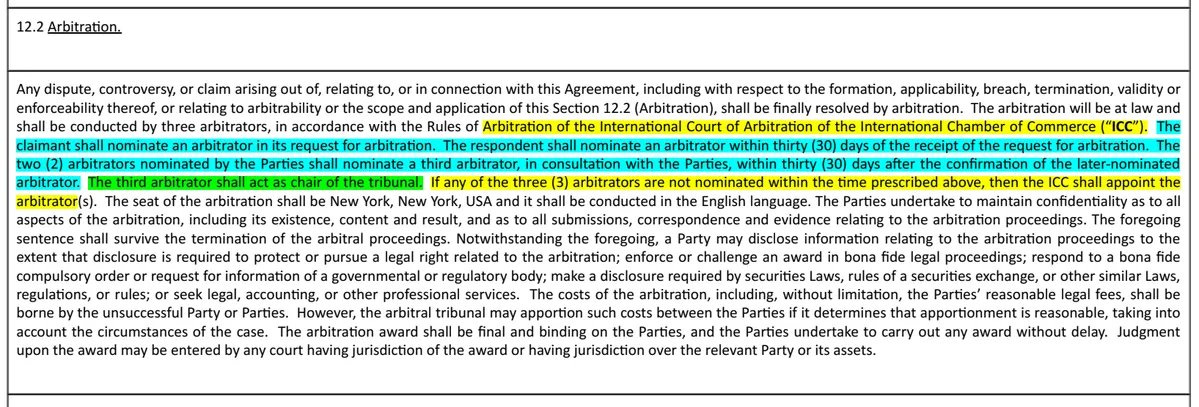
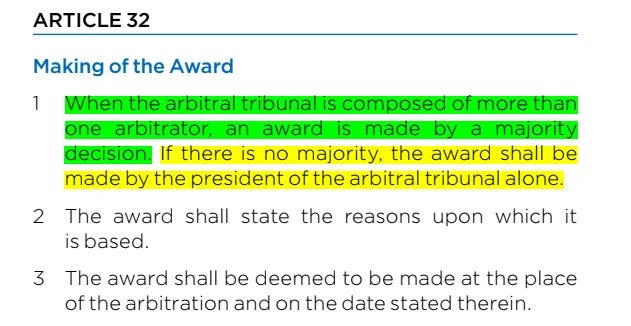
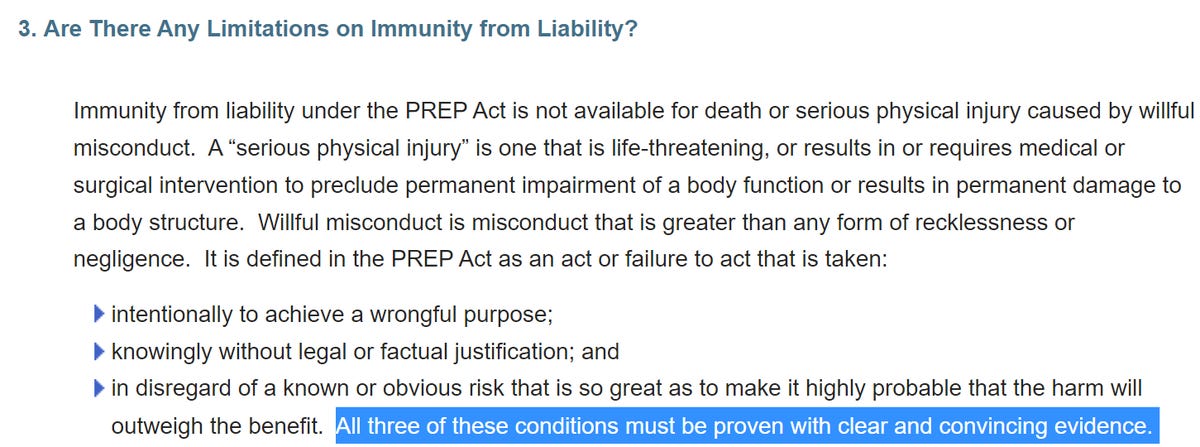






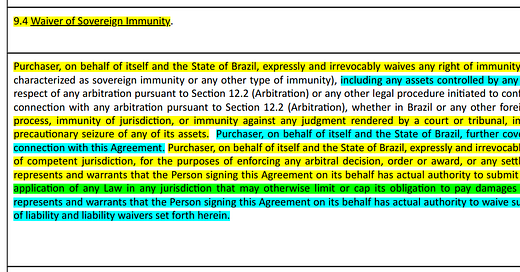

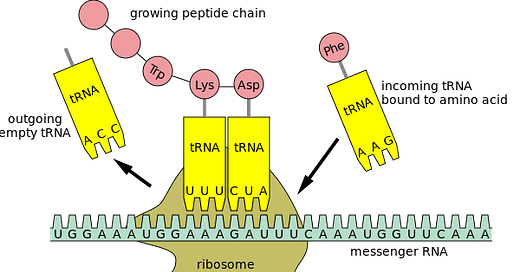

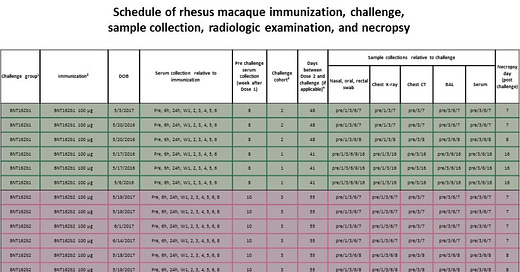

Now that forfeiture clause is very interesting. Having produced a product that is manifestly bad is likely to be throw by out by nations desperate to save themselves and their people allows the backers of this initiative (the bankers) to seize assets they would otherwise have no recourse to. Asset seizure as a core driving force.
Wow! Boy they sure knew what they were doing. Are there any countries that did NOT sign on with Pfizer??? Thank you for this info. Very informative but I bet Thailand is PISSED. Hopefully they will share this themselves GLOBALLY.